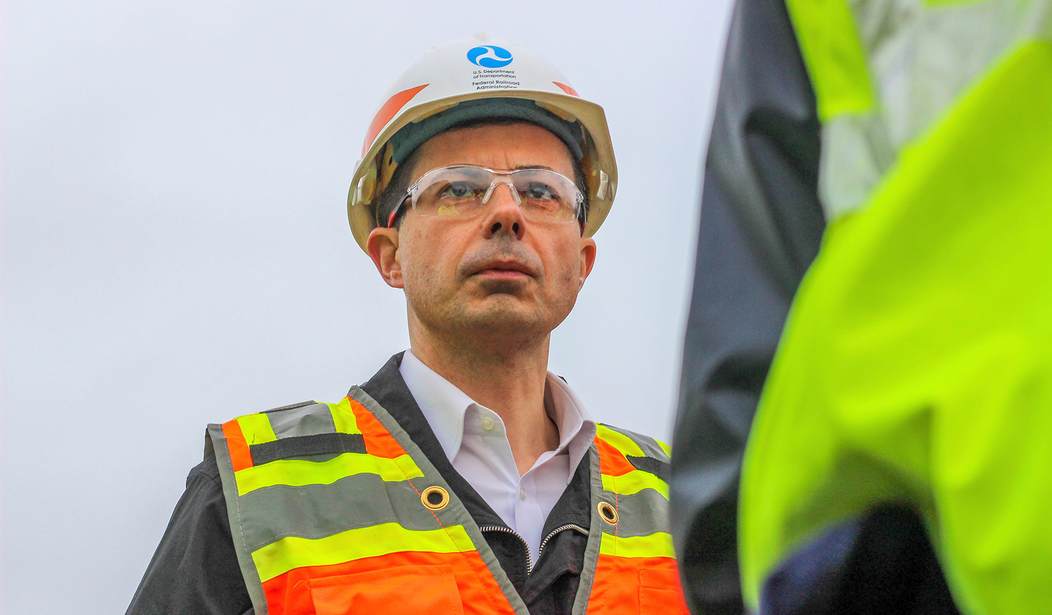Last week, the Supreme Court ruled in Creative LLC v. Elenis that the government cannot force Americans to express messages that violate their sincerely held religious beliefs. Reacting to the court’s decision siding with Christian web designer Lorie Smith, Transportation Secretary Pete Buttigieg claimed the case was “a solution looking for a problem.”
“I think it’s very revealing that there’s no evidence that this web designer was ever even approached by anyone asking for a website for a same-sex wedding. Matter of fact, it appears this web designer only went into the wedding business for the purpose of provoking a case like this,” Buttigieg told Dana Bash on CNN’s “State of the Union.”
“In that sense, I think there’s something in common between this Supreme Court ruling and what we’re seeing happening in state legislatures across the country, which is kind of a solution looking for a problem,” he added. “In other words, sending these kinds of things to the courts and sending these kinds of things to state legislatures for the clear purpose of chipping away at the equality and the rights that have so recently been won in the LGBTQ+ community.”
When asked for his thoughts on SCOTUS decision in 303 Creative LLC v. Elenis, Pete Buttigieg claims without evidence that Lorie Smith "only went into the wedding business for the purpose of provoking a case like this." pic.twitter.com/Ln6KTqsfbe
— Kevin Tober (@KevinTober94) July 2, 2023
As Heritage Foundation legal fellows Thomas Jipping and Sarah Parshall Perry point out, Smith wanted to expand her business to do wedding websites, but given Colorado’s Anti-Discrimination Act and how the Colorado Commission on Civil Rights has treated Masterpiece cakeshop owner Jack Phillips, she was hesitant.
Recommended
To clarify her rights and make sure she wouldn’t be found in violation of the Colorado Anti-Discrimination Act, Lorie filed a lawsuit, asking for an injunction to prevent Colorado from forcing her to create websites for marriages that defy her beliefs. That was a very real possibility, with very serious potential consequences.
The public accommodations law in Colorado allows anyone in the state to file a complaint, which launches an extended hearing process. The state commission can impose fines, even require violators to participate in mandatory “educational programs,” and force them to submit ongoing reports about compliance with the public accommodations law.
The district and appeals courts acknowledged that Lorie’s website creations were “pure speech” protected by the First Amendment.
The Supreme Court has an extensive history of cases recognizing that these “expressive” forms of speech (from parades to armbands) are entitled to the full protection of the First Amendment. It still ruled against her, however, concluding that ensuring equal access to publicly available goods and services was so important that it justified coercing Lorie into either saying what the state wanted her to say, or not going into the wedding website business at all.
Writing for the 6-3 majority, Justice Neil Gorsuch disagreed. In case after case, the Supreme Court has held that the First Amendment not only protects an individual’s right to speak her mind but prohibits the government from compelling her to “speak its own preferred messages.” (The Daily Signal)
Critics said Buttigieg should stick to transportation issues, of which there are plenty.
There was a major train derailment and Atlanta International is completely FUBAR right now, so of course the transportation Secretary is busying himself with SCOTUS rulings on wedding website case law.
— Brad Slager: CNN+ Lifetime Subscriber (@MartiniShark) July 2, 2023
This guy’s resume’ is basically a pothole. https://t.co/NY3UEpZZbk
Why is the Transportation Secretary being asked about this instead of the FAA's monumental failures over the last couple of weeks? https://t.co/lMCsSSLQ5R
— Kyle Raccio (@kyleraccio) July 2, 2023

























Join the conversation as a VIP Member